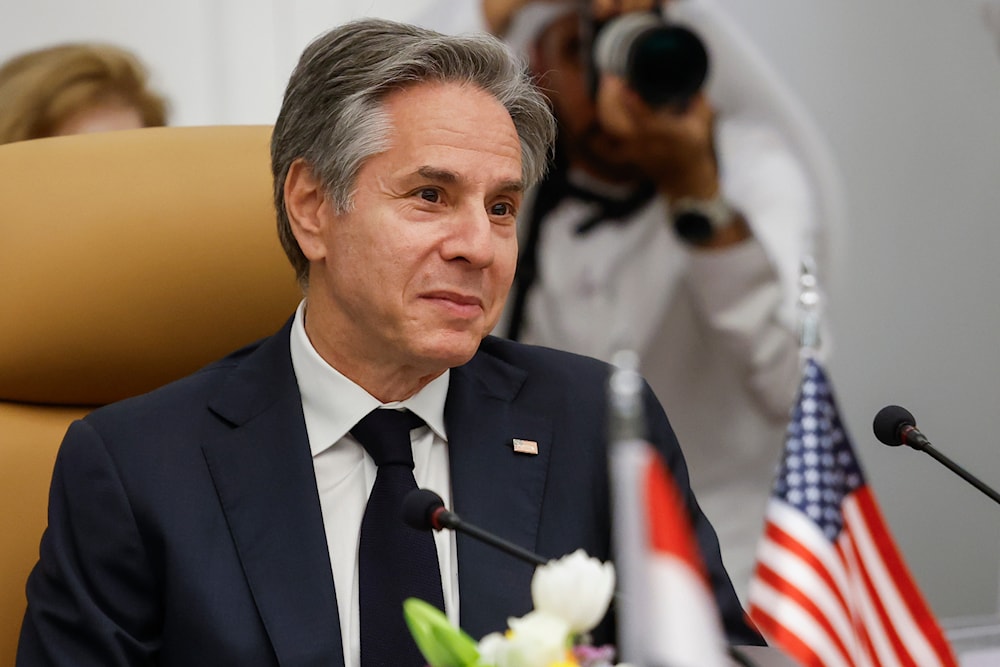Blinken urges Hamas to accept meagre Israeli ceasefire proposal: Axios
US Secretary of State Antony Blinken calls on Hamas to agree to the Israeli ceasefire deal that fails to meet its fundamental demands.
-

US Secretary of State Antony Blinken attends the US-Arab Quint Meeting with representatives from Egypt, Jordan, Saudi Arabia, Qatar, the United Arab Emirates, and the Palestinian Authority, in Riyadh, Saudi Arabia, April 29, 2024 (AP)
The Israeli occupation has given the Palestinian Resistance a "very generous" offer to release the Israeli captives, which could potentially lead to a ceasefire in Gaza, US Secretary of State Antony Blinken claimed Monday at the World Economic Forum in the Saudi capital of Riyadh.
Palestinian Islamic Jihad (PIJ) politburo member Ihsan Ataya told Al Mayadeen on Monday that the proposal presented to the Resistance in the negotiations is not as generous as the Americans, who are trying to deceive the world, are making it out to be.
"The proposed offer has major loopholes and malicious plots," Ataya stressed. "The proposal presented is three and a half pages long and talks about details in three stages," he revealed.
US officials claim that they are committed to securing a ceasefire deal and ending the Israeli war on Gaza due to it obstructing President Joe Biden's vision for a post-war Middle East - not due to the countless massacred civilians and Israeli violations of international law.
The US is eyeing normalization between the Israeli occupation and Saudi Arabia, which Riyadh has ironically been massively hinging on a solution to the Palestinian issue, which in turn cannot start without a ceasefire in Gaza.
About two weeks ago, The Wall Street Journal reported that the Biden administration was trying to conclude a diplomatic deal aimed at pressuring Israeli Prime Minister Benjamin Netanyahu to recognize a Palestinian state in exchange for normalizing relations with Saudi Arabia.
A source in the Saudi royal family told Makan that the ball was now in Netanyahu's court, and he must choose between peace with Saudi Arabia and solving the Palestinian issue or continuing the conflict with the Palestinians without peace with Saudi Arabia.
October 7 obstructed normalization
Yoel Guzansky and Udi Dekel, two senior researchers at the Israeli National Security Research Institute, completed a study examining the issue of Israeli-Saudi normalization, which has been constantly obstructed since Operation Al-Aqsa Flood was launched on October 7, 2023.
According to the researchers, "Israel", after six months of the war, is now faced with making a strategic decision that combines ending its genocide in Gaza [which includes the complete reconstruction of the Strip and ensuring its stability], sealing the deal that normalizes bilateral relations with Saudi Arabia, and pushing for a solution for what the institute labeled as the "Israeli-Palestinian conflict".
The study mentions that this aids "Israel" in its quest to enhance relations with Saudi Arabia and the United States.
Read more: Why is Saudi Arabia open to normalize relations with 'Israel'?
Dekel and Guzansky noted that "Israel" would greatly benefit from normalizing ties with Saudi Arabia, including Saudi Arabian interference in Palestinian affairs, particularly in managing Gaza and rebuilding it after the war.
They added that although the onslaught in Gaza was still ongoing, political calls aimed at establishing official ties between "Israel" and Saudi Arabia did not stop, with constant brokering by the United States. The researchers claimed that Hamas managed to obstruct the normalization process by launching its October 7 operation.
Dekel and Guzansky stated that "Israel" is demanding increased Saudi Arabian intervention in the Palestinian sphere exhibited in the reconstruction and governance of the Gaza Strip and handling the popular and public opinion that has solidified against "Israel" among vast Arab communities.
For instance, Saudi Arabia would have to handle 90% of Khaliji citizens, including Saudi Arabians, who oppose the normalization of relations with "Israel".
In this context, however, the researchers warned that the gap between governmental policies in the Gulf, and the public opinion of the citizens of the Gulf, is only expanding, particularly when it comes to the Palestinian cause.
The researchers pointed out that against the backdrop of the war in Gaza and its outcomes, changes have occurred in the conditions of both parties (Israeli and Saudi) for signing a bilateral normalization agreement. Saudi Arabia now insists on signing defense agreements with the United States against Iran, and on obtaining assistance [and approval] from it to establish civilian nuclear infrastructure without Israeli objection. Saudi Arabia also wants to ensure an Israeli commitment to continue enhancing the "two-state solution" and establish a "renewable" Palestinian authority.

 4 Min Read
4 Min Read








